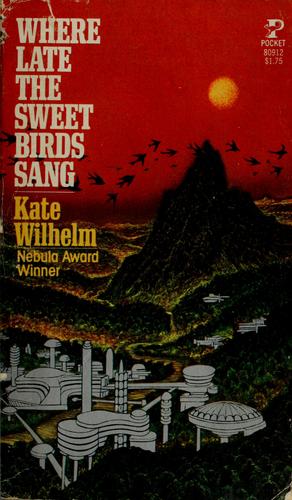Curtis reviewed Where late the sweet birds sang by Kate Wilhelm
Review of 'Where late the sweet birds sang' on 'Goodreads'
4 stars
An interesting story. I'm intrigued by the repeated themes of creation and destruction — not to mention their combination in the idea of flawed perfection, such as with Molly's portraits. David's attempt to destroy the mill when he realizes his clones are eliminating individuality dovetails nicely with Mark's destructive pranks later — which we learn are actually necessary to perpetuate humanity, as the clones do not have the imagination to see their own demise (another repeated theme, given that apparently only one extended family in the entire world has the foresight to establish a long-term, self-sustaining community to outlast the coming destruction). The end is clearly not an end, but another iteration in the cycle, although we might hope otherwise.
I particularly liked the way that Wilhelm wrote characters out of the story. Another writer might have been tempted to give a hint as to what happened to David or Molly and the others who leave. Except for the party that dies of radiation poisoning outside of Philly (a particularly disturbing image for me personally, as I was born in that great city!), we never get a clear idea about the fates of anyone who leaves the valley. The probability that they meet some doom lingers at the back of the mind throughout the story, yet there's always a glimmer of expectation that we might run across them at the end. Not knowing for sure is a more haunting proposition than revealing that they did indeed suffer some calamity, if only because there's the possibility that they did not.
Finally, Wilhelm does a great job at showing both the anxiety and inevitability (or inexorability) of parenthood. While we might like to think we have an influence on successive generations, ultimately they will do what they want themselves. The best we can do is to do the best we can do; rather than trying to force others, either older or younger, to do what we want, we should acknowledge our lack of power over the ever-slowly-changing zeitgeist and work to make things as good as we can. There's a huge potential for social commentary here — from the Baby Boomers retiring and its implication on job and retirement security for their kids and grandkids, to the ongoing developments in civil liberties...or violations thereof.
If I have a criticism of Wilhelm's book, it's that in some spots she seems to miss opportunities to make things a little clearer. In particular, many of Mark's movements seem a little too instantaneous, especially near the end, but even throughout the rest of the story there are places where physical or temporal jumps are made which aren't very clear. Also, in a few spots it would be nice to know how old some of the characters are — for the most part, it's not necessary, but having a better understanding of ages might also help to understand the relationships between some of the characters, especially since as we begin dealing with so many clones at various stages of development. All in all, though, these are relatively minor, but I feel it pulled me enough out of the story to make it not quite a 5-star rating: I'd give this 4.5 stars out of 5 if Goodreads allowed half-stars.

